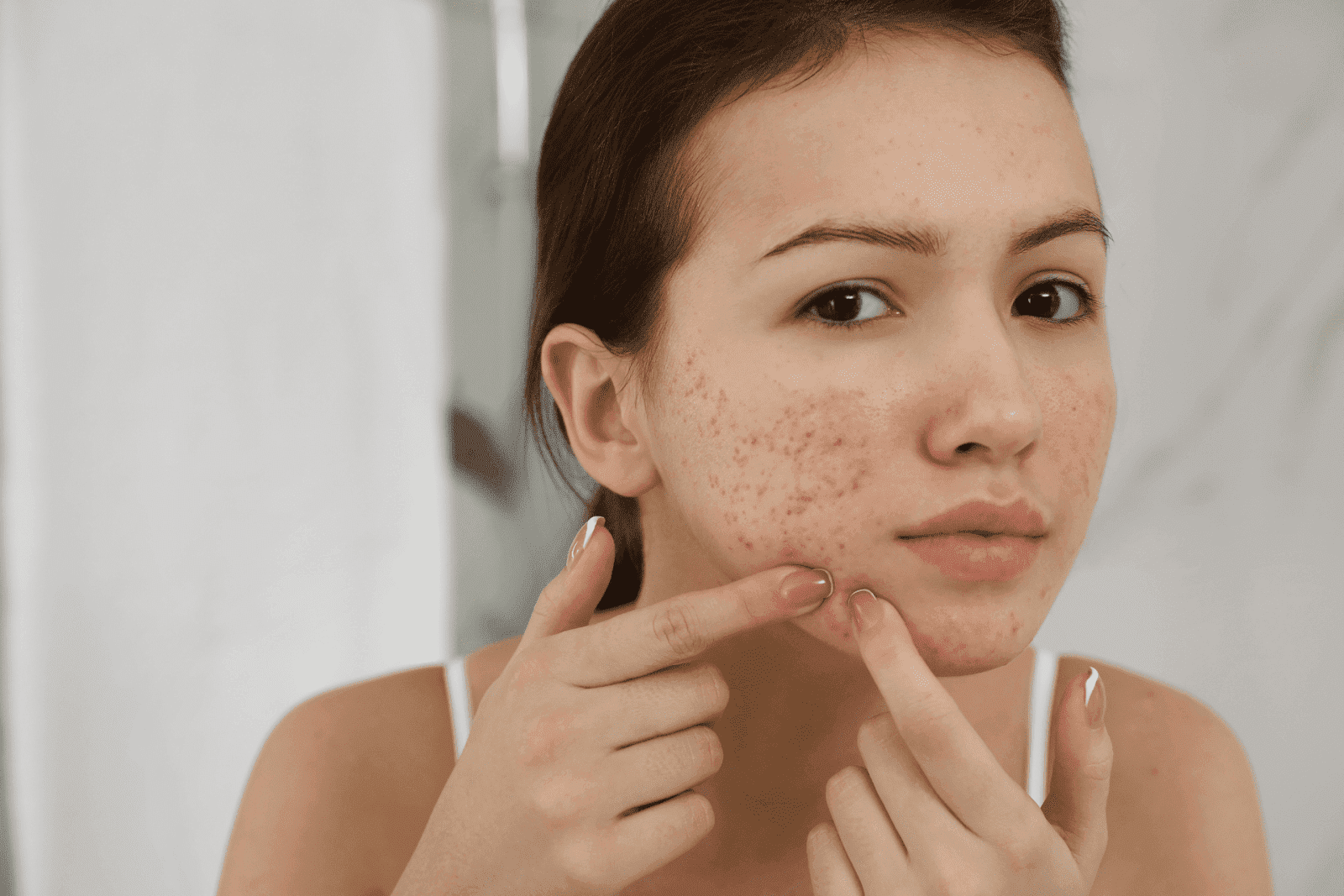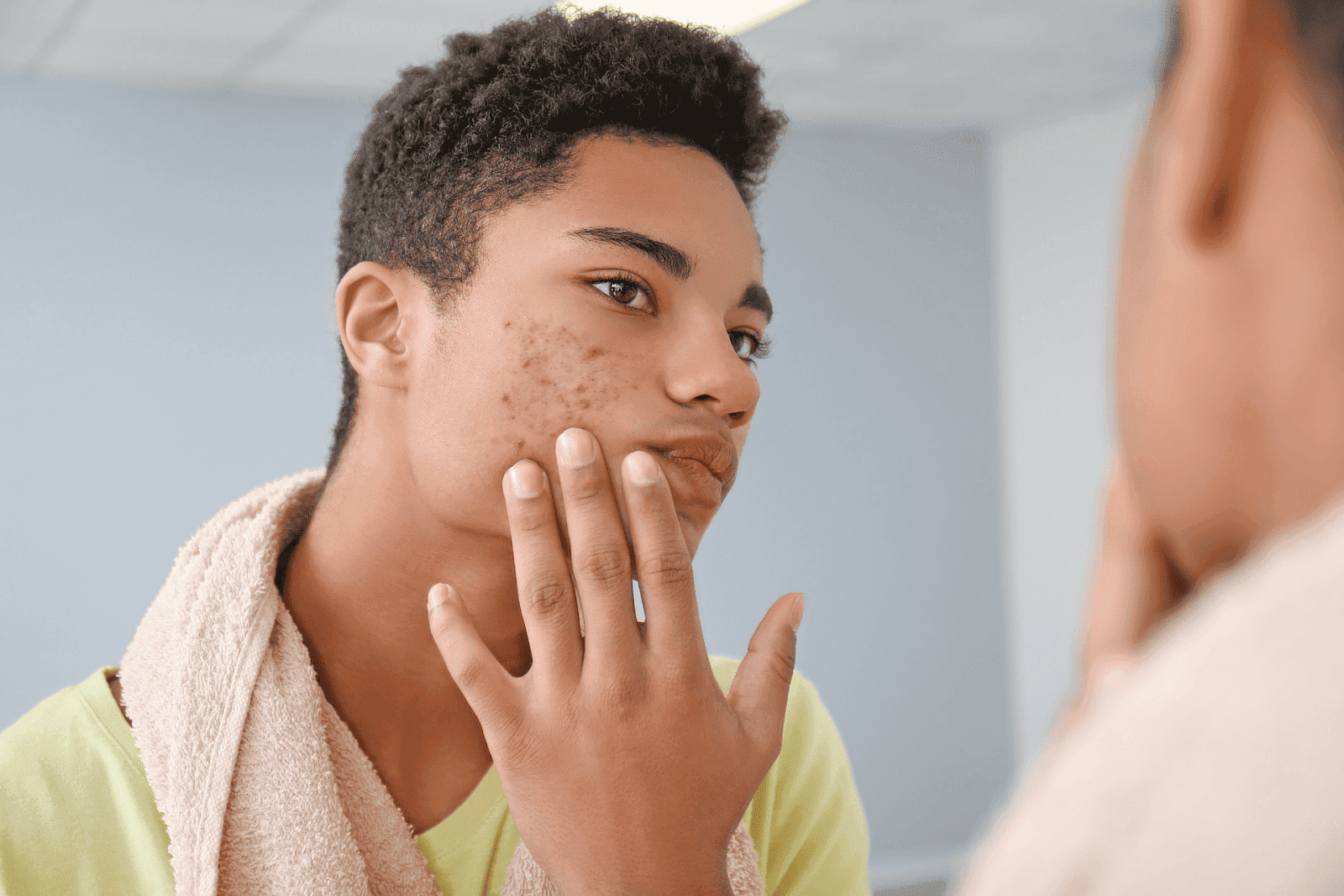Vaginal Odor During Menopause: Causes and Solutions
Why Vaginal Odor Changes During MenopauseMany women notice their body smells different as they enter menopause. This shift catches them off guard, and the topic remains one [...]
Read More
Medically reviewed by Alan Lucks | MD, Alan Lucks MDPC Private Practice - New York on October 11th, 2025.
Inflammatory mediators like histamine and cytokines released during the immune response to P. acnes bacteria directly stimulate itch-sensing nerve fibers in affected follicles.
Benzoyl peroxide concentrations above 2.5% and retinoids like tretinoin commonly cause irritant contact dermatitis within 2-4 weeks of starting treatment, manifesting as itchy, flaky skin around breakouts.
Contact allergies to common preservatives like methylisothiazolinone or botanical extracts affect up to 15% of people with sensitive skin, causing delayed itchy reactions 24-72 hours after product application.
Niacinamide at 2-5% concentration reduces inflammatory cytokine production and strengthens the skin barrier without comedogenic effects, making it ideal for itchy, acne-prone skin.
Warning signs requiring immediate evaluation include fever, rapidly spreading erythema beyond the original lesion, purulent drainage, or development of urticarial wheals suggesting bacterial superinfection or systemic allergic reaction.
Acne is a common skin condition that affects millions of people worldwide, yet many are puzzled when their acne becomes itchy. This uncomfortable sensation can add to the frustration of dealing with breakouts, making it harder to resist scratching and potentially worsening the condition. Understanding why acne itches, what causes this symptom, and how to manage it effectively is essential for maintaining healthy skin and preventing further irritation.
 What Causes Acne to Become Itchy?
What Causes Acne to Become Itchy?Itchiness in acne is often linked to a variety of factors that involve the skin’s response to inflammation, irritation, and sometimes infection. Clogged pores cause acne itself due to excess oil, dead skin cells, and bacteria, but the itchiness comes from the skin’s reaction to these underlying issues.
When pores become clogged, the body’s immune system responds by sending white blood cells to fight the bacteria, particularly Propionibacterium acnes. This immune response triggers inflammation, which can cause redness, swelling, and itchiness. The release of histamines during this process is a key factor that leads to the sensation of itching.
Histamines are chemicals that the body produces in response to allergens or irritants, and they stimulate nerve endings in the skin, causing the itch sensation. This is why inflamed acne lesions often feel itchy as the body tries to heal itself. Furthermore, the presence of inflammatory cytokines can amplify the itch response, creating a cycle where the more inflamed the acne becomes, the itchier it feels, prompting individuals to scratch, which can further irritate the skin and exacerbate the condition.
Many acne treatments, such as topical retinoids, benzoyl peroxide, and salicylic acid, can dry out the skin. When the skin barrier is compromised, it loses moisture and becomes more sensitive, leading to itchiness. Dry, flaky skin around acne lesions can exacerbate the sensation, making it uncomfortable to resist scratching.
Sometimes, the itchiness is not from the acne itself but from the skin drying out due to these treatments or environmental factors like cold weather and low humidity. In addition, over-cleansing the skin or using harsh soaps can strip away natural oils, further contributing to dryness and irritation. This creates a vicious cycle where the skin becomes more prone to breakouts due to the disrupted barrier, leading to more treatments and, consequently, more dryness and itchiness.
It is also possible that itchiness arises from an allergic reaction to skincare products, makeup, or even laundry detergents. Ingredients such as fragrances, preservatives, or dyes can irritate sensitive skin, especially when the skin is already inflamed by acne. This can cause itching and worsen the overall condition.
In some cases, individuals may not even realize that they are sensitive to certain ingredients until they notice increased itchiness and irritation. Patch testing can be a useful method for identifying potential allergens in skincare products. Additionally, switching to non-comedogenic and hypoallergenic products can help minimize irritation and reduce the likelihood of itchiness, allowing the skin to heal more effectively while managing acne symptoms.
While itchiness is common, certain signs indicate that the condition may require professional evaluation and treatment. Persistent, severe itching accompanied by other symptoms could suggest complications or alternative diagnoses.
If your acne lesions become increasingly painful, swollen, warm to the touch, or start oozing pus, these may be signs of a secondary bacterial infection. Infections can intensify itchiness and require prompt medical treatment to prevent spreading or scarring. It’s important to note that acne can sometimes lead to the formation of cysts, which may also become infected. These cysts can be particularly troublesome, as they not only cause discomfort but can also leave behind significant marks or scars if not treated appropriately. If you notice any of these symptoms, don’t hesitate to consult a dermatologist who can provide a tailored treatment plan.
In rare cases, allergic reactions to acne medications or skincare products can cause widespread itching, redness, and even hives. If you experience these symptoms, discontinue use of the suspected product and seek medical advice immediately. It’s also crucial to keep track of any new products you introduce to your skincare routine, as reactions can sometimes occur even after prolonged use. Patch testing new products on a small area of skin can help minimize the risk of a full-blown allergic reaction. Additionally, be aware that some ingredients, such as fragrances or certain preservatives, are common culprits in allergic responses, so always read labels carefully.
Sometimes, what appears to be itchy acne could be a different skin condition, such as eczema, psoriasis, or folliculitis. These conditions may mimic acne but require different treatments. Consulting a healthcare professional can help ensure an accurate diagnosis. For instance, eczema often presents with dry, itchy patches that can become inflamed, while psoriasis is characterized by thick, scaly plaques that may also itch. Folliculitis, on the other hand, occurs when hair follicles become inflamed, leading to red bumps that can resemble acne. Understanding the nuances of these conditions is essential for effective management, and a dermatologist can recommend appropriate therapies that target the specific issue at hand. Furthermore, lifestyle factors such as stress, diet, and environmental triggers can exacerbate these conditions, making it vital to adopt a holistic approach to skin health.
Managing itchy acne involves a combination of gentle skincare, avoiding irritants, and using appropriate treatments to reduce inflammation and dryness.
Choose mild, fragrance-free cleansers and moisturizers designed for sensitive or acne-prone skin. Avoid harsh scrubs or exfoliants that can irritate the skin further. Keeping the skin hydrated helps maintain the skin barrier and reduces itchiness.
Though it can be tempting, scratching acne can worsen inflammation, cause skin damage, and increase the risk of scarring. Instead, try applying a cool compress or using over-the-counter anti-itch creams recommended by a healthcare provider.
Topical treatments that reduce inflammation, such as those containing niacinamide or aloe vera, can help soothe irritated skin. If dryness is an issue, incorporating gentle moisturizers can alleviate itchiness without clogging pores.
If itchiness persists or worsens, it is important to seek medical advice. Telehealth services like Doctronic.ai provide convenient access to licensed doctors who can evaluate your symptoms, recommend appropriate treatments, and offer personalized care without leaving your home. This is especially valuable for those who want expert guidance quickly and affordably.
In today’s digital age, AI-powered telehealth platforms are transforming how people access medical care, including dermatology and acne treatment. Doctronic.ai is at the forefront of this revolution, offering fast, smart, and personalized healthcare solutions.
Doctronic’s AI doctor uses the latest peer-reviewed medical research to analyze your symptoms and provide comprehensive answers within seconds. This means you can get a reliable assessment of why your acne is itchy and what steps to take next without waiting days for an appointment.
Unlike traditional healthcare, Doctronic’s AI remembers your medical history and preferences, offering a more personal and continuous care experience. This can be particularly helpful for chronic conditions like acne, where ongoing management is key.
With telehealth video visits available 24/7 across all 50 states for under $40, Doctronic makes quality dermatological care accessible to everyone. Whether you need a prescription, treatment advice, or a second opinion, expert help is just a few clicks away.
For those struggling with itchy acne and seeking expert advice, Doctronic.ai offers an innovative and convenient solution that fits into your busy lifestyle.
Prevention is always better than a cure. Adopting healthy skincare habits and lifestyle changes can reduce the likelihood of developing itchy acne.
Regular cleansing with gentle products helps prevent clogged pores and reduces inflammation. Moisturizing daily keeps the skin barrier intact and minimizes dryness-related itchiness.
Use makeup, sunscreen, and skincare products labeled “non-comedogenic” to avoid blocking pores and triggering acne flare-ups.
Stress and certain foods can influence hormone levels and skin health. Incorporating stress-reduction techniques and a balanced diet rich in fruits, vegetables, and omega-3 fatty acids may help improve acne symptoms.
Hands carry bacteria and oils that can aggravate acne. Resist the urge to touch or pick at your skin to prevent irritation and infection.
 Smarter Dermatology Starts with Accessible Telehealth
Smarter Dermatology Starts with Accessible TelehealthItchy acne is a frustrating and uncomfortable symptom that can arise from inflammation, dryness, allergic reactions, or infections. Understanding the causes and knowing how to manage itchiness can help maintain healthier skin and reduce the risk of complications. When in doubt, seeking professional advice is crucial.
Thanks to advancements in telehealth, expert dermatological care is more accessible than ever. Doctronic.ai provides fast, affordable, and personalized medical support, making it easier to get the right treatment for itchy acne without leaving home.
By adopting gentle skincare habits and consulting healthcare professionals when needed, you can effectively manage itchy acne and enjoy clearer, more comfortable skin.
Don't let itchy acne disrupt your life. Experience the future of dermatology with Doctronic, the #1 AI Doctor. Our cutting-edge AI technology provides fast, innovative, and personalized medical advice, revolutionizing the way you manage your skin health. With over 10 million satisfied users and the convenience of 24/7 access in all 50 states, you're just moments away from expert care. Skip the line. Talk to an AI Doctor Now, for free.
Itchy breakouts typically result from inflammation, over-drying treatments, or product sensitivities rather than the acne itself. Focus on gentle cleansing, barrier repair with ceramides or hyaluronic acid, and avoiding harsh scrubbing which can worsen both conditions. If you're struggling with persistent itchy breakouts, Doctronic can help identify triggers and develop an appropriate treatment plan.
Why Vaginal Odor Changes During MenopauseMany women notice their body smells different as they enter menopause. This shift catches them off guard, and the topic remains one [...]
Read MoreUnderstanding Your Options for Sciatic Nerve PainSciatica affects approximately 10% to 40% of people at some point in their lives, making it one of the most common sources of [...]
Read MoreWhy Pain Behind the Knee Demands AttentionThat nagging ache behind the knee catches people off guard. Unlike front-of-knee pain that often comes from obvious overuse, [...]
Read More